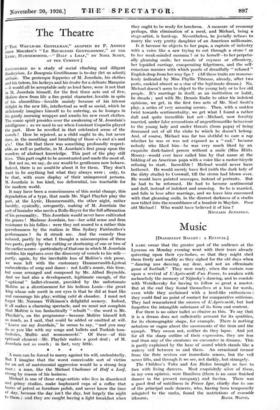The Theatre
['; THE WOULD-BE GENTLEMAN," ADAPTED BY F. ANSTEY FROM MOLI11IE'S " LE BOURGEOIS GENTILHOMME," AT THE LYRIC, HAMMERSMITH.—" HALF A LOAF," BY NOEL SCOTT, AT THE COMEDY.] CONSIDERED as a study of social climbing and diligent aanheyism, Le Bourgeois Gentilhomme is to-day (let us admit) archaic. The grotesque fopperies of M. Jourdain, his clothes and his tutors, his lackeys and his tendre for a delicate Marquise --it would all be acceptable only as loud farce, were it not that in M. Jourdain himself, for the first three acts out of five, Moliere drew from life a fine genial character, lovable in spite of his absurdities—lovable mainly because of his intense delight in the new life, intellectual as well as social, which he deliciously imagines himself to be entering, as he lounges in his gaudy morning wrapper and awaits his new court clothes. The comic spirit presides over the awakening of M. Jourdain's inteffigenee ; as we used to see when Constant Coquelin played the part. How he revelled in that celebrated scene of the vowels ! How he rejoiced, as a child ought to do, but never does, in the mouthing and breathing of those o's and a's and u's ! One felt that there was something profoundly respect- able, as well as pathetic, in M. Jourdain's first grasp upon the wonders of abstract knowledge. This part of the play still lives. This part ought to be accentuated and made the most of.
But not so, we say, do our would-be gentlemen now behave. Indeed, there is no would-be about it for them. They don't want to be anything but what they always were ; only, to be that, with more display of their unimproved persons. M. Jourdain is too kind, too deferential, too teachable for the modern world.
It may have been a consciousness of this social change, this degradation of a type, that made Mr. Nigel Playfair play the part, at the Lyric, Hammersmith, the other night, rather harshly, cynically, arrogantly, making of M. Jourdain the sort of bounder who needs a Rolls-Royce for the full affirmation of his personality. This Jourdain would never have cultivated the graces ! Madame Jourdain, too—her solid sense and firm resistance to his follies : were they not soured to a rather thin querulousness by the realism in Miss Sydney Fairbrother's performance ? So it struck me. And the comedy thus reduced, partly by what I thought a misconception of these two parts, partly by the cutting or shortening of one or two of the earlier scenes—particularly of that one in which M. Jourdain confides his raptures over the discovery of vowels to his wife— partly, again, by the inevitable loss of Moliere's rich prose, we were left with the customary Hammersmith-Lyrical embroideries of song and dance : not Lull's music, this time, but some arranged and composed by Mr. Alfred Reynolds. And we had also a development, legitimate enough, of the " optional " ballet-element, provided by the unfortunate Moliere as a divertissement for his tedious Louis—the great king whose sole merit in our eyes is that he did at least like and encourage his play, writing valet de chambre. I must not forget Mr. Norman Wilkinson's delightful scenery. Indeed, it all makes a charming spectacle, and we must not complain that Moliere is too fantastically " rebuilt "—the word is Mr. Playfair's, on the programme—because Moliere himself left So =jell, as I said, that could be added or omitted at will. " Leave me my Jourdain," he seems to say, " and you may do as you like with my songs and ballets and Turkish tom- fooleries, Muftis and mamamouchi." Of these—of this optional element—Mr. Playfair makes a good deal ; of M. Jourdain not so much ; in fact, very little.






























































 Previous page
Previous page